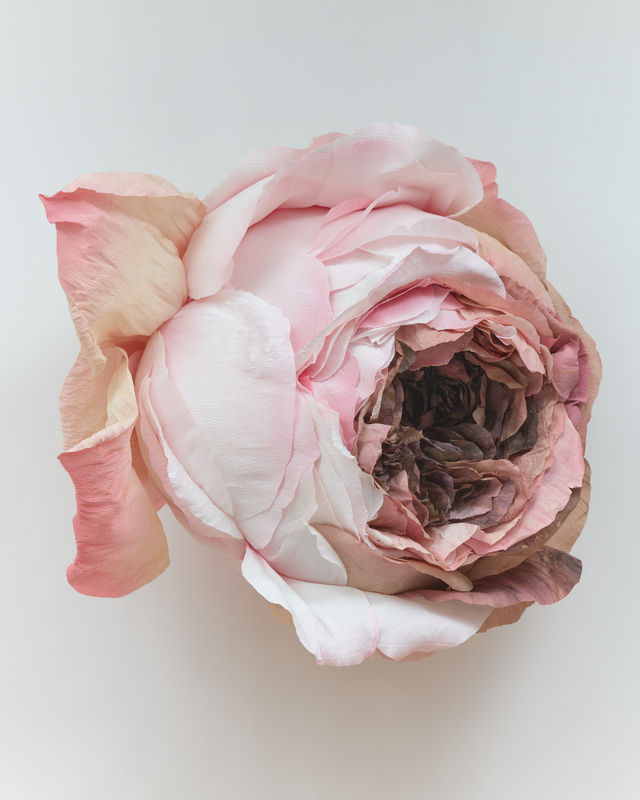Through her use of extraordinary detail and oversized beauty and decay, Turner presents American Grown, a meditation on her own life and American culture.
Eleanor Harwood Gallery is delighted to announce our second solo show with Tiffanie Turner opening in our newly expanded gallery.
Tiffanie Turner is an architect, author, and artist known for her small, meticulously detailed paper flowers and her giant paper botanical sculptures. At both scales, her sculptures of flowers deform, reform, pile up, contradict, and contort what we think of as a typical blossom. She pulls focus away from the specific blooms depicted, but uses their floral familiarity and allure to draw the viewer into her sculptures and the meanings behind them.
Turner’s work connects the associations and formal similarities of certain flowers with recognizable objects and themes to take on agism, sexism, conventional beauty standards, generational differences, marriage, and motherhood. Much of her work is faded, aged, or mutated, all metaphors of the impact of aging on our own bodies as well as a metaphor for some of the darker parts of American culture. Turner uses her sculptures to work through these issues, creating thousands and thousands of hand-cut petals out of Italian crepe paper, carefully sculpting and painting them into astonishing works.
One sculpture titled Originalism (December 15, 1791 - present), refers to the ratification of the Bill of Rights which put into law the right to bear arms. Her sculpture contains fifteen dead flowers (peonies, symbolizing shame in some cultures), one each for “15” in the ArmaLite semi-automatic rifle model AR-15. “Originalism” refers to the “principle or belief that a text should be interpreted in a way consistent with how it would have been understood or was intended to be understood at the time it was written.” Turner is addressing proponents of constitutional originalism and the continuation of gun violence, the faded bunch of flowers stands in as a memorial and a meditation on gun deaths in America.
Turner's 580085, is a sculpture constructed like a Rorschach test with four rose blooms. It quite literally asks us to look at the blooms and choose what we see. Do we see the deformity of a mutated double bloom? Or do we see the sculpture as beautiful? Do we see differences as alluring or do we only see a single perfect rose bloom as the “right” kind of bloom? Turner is always playing with our perceptions of beauty and “normalcy” guiding us to see imperfection as interesting, as a “fascination", as a botanist would term a deviation in a flower.
The full body of sculptures in American Grown is the result of two and a half years of work. Turner had three tenets as her guiding principles for American Grown. One, to become “anti-circle”, to physically change her work from wall-mounted, front-facing circles, to forms that were conical, multi-directional, angled, upward, mirrored, elongated, and beginning to defy gravity. Second, after almost a decade of thinking about and staring at nothing but flowers in her work, she sought to draw on resemblances she noticed between flowers and other earthly objects, both natural and manmade. She drew on those resemblances, associations, and formal similarities to imbue meaning into her sculptures, hoping that even if the viewer never connects the multi headed “Cockscomb Rose” to the very common fasciated strawberry of the same name, they will still wonder about the piece, and perhaps find something in it that she hasn't yet seen. The third and final tenet was to connect this work back to her childhood, comparing and contrasting the standards and safeguards around the raising of her two children with memories of her grandparents and parents, focusing on the past, present, and future, in the timeframe of 1950 to 2050.
Through her use of extraordinary detail and oversized beauty and decay, Turner presents American Grown, a meditation on her own life and American culture.
Artist Statement for American Grown
Turner conceived the theme of this show in the first year of the pandemic, when her shame about being an American was at an all time high. A cartoon of an American was swirling in her head: a styleless, gun-loving, misogynistic, God-fearing racist. She says she was focusing on a caricature of a person she didn’t actually know, and as she picked apart the different reasons to be ashamed about being an American, she realized that these traits are universal to many populations (except the gun violence, which seems exclusive to the culture of the United States), and that maybe she wasn’t qualified or even motivated to speak on Americans at large.
So American Grown turned personal. It evolved to depict, through memories and associations with certain floral forms, being a Gen-Xer with one foot in the pre-technology 1950’s of her grandparents and one in the 2050’s, when who knows what world our children’s children will inherit. The idea of being a latchkey kid who turned into a self professed “helicopter parent” and why that is. Turner took a semi-nostalgic trip down memory lane and contrasted it with where we are now to arrive at the concept of this exhibit. The flowers in this body of work tie back to themes of food, waste, marriage, sex, keeping up appearances, and a meditation on the lie that was American exceptionalism.


